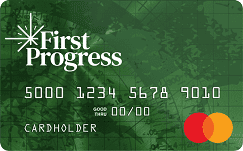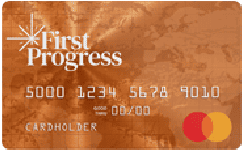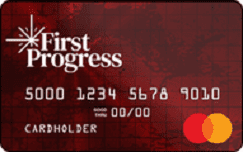It can be a long and unknown path when you are trying to rebuild your credit. Especially if you aren’t leveraging the right resources.
One thing that can help you rebuild your credit with responsible account use is through a secured card – a credit card that requires a small deposit where you can use that deposit as your credit line.
So in this article, I’m going to outline three cards offered by First Progress – all secured, and all designed to help you get your credit profile back on track.
The three cards, compared
| First Progress Platinum Prestige Mastercard® Secured Credit Card | First Progress Platinum Select Mastercard® Secured Credit Card | The First Progress Platinum Elite Mastercard® Secured Credit Card | |
|---|---|---|---|
| APR | 15.24% variable | 19.24% variable | 25.24% variable |
| Annual fee | $49 | $39 | $29 |
| Rewards | Rewards Rate: 1% Cash Back | Rewards Rate: 1% Cash Back | None |
The First Progress Platinum Prestige Mastercard® Secured Credit Card has the lowest purchase APR – 15.24% Variable – but the highest annual fee – $49.
I recommend the First Progress Platinum Prestige MasterCard® Secured Credit Card for those who intend to use their card more often. There is no minimum score – or even a credit history – required to get the card.
First Progress Platinum Prestige Mastercard® Secured Credit Card
Annual Fee
Intro APR, Purchases
Intro APR, Balance Transfers
Regular APR
Credit Needed
$49
N/A
N/A
15.24% Variable
Poor/Limited/No Credit
Key facts:
- Best for – Building your credit with on-time payments and a low APR.
- APR for Cash Advances – 24.24% Variable.
- Annual fee – $49.
- Cash advance transaction fee: – $10 or 3% of each cash advance, whichever is greater.
- Foreign transaction fee: – 3% of the transaction amount.
- Late payment fee – Up to $41.
- Returned payment fee – Up to $30.
Pros:
- Reasonable purchase APR – For a secured card, a 15.24% Variable rate is actually pretty good. Now, I always recommend you pay your balance in full but if you don’t, this is actually a pretty favorable rate.
- Credit limit increases over time – If you make timely payments consistently, you’ll eventually be eligible for a credit line increase. What’s even better is that you won’t have to put down an additional security deposit to get a higher credit line.
- Get your deposit back – Once you pay your balance in full, you can request to get your deposit back in full as well. Now, you’ll need to put a deposit down again if you want to use the card, but in dire straits, this is a nice option to have.
- No credit history required – You can get approved for this card with no credit or completely damaged credit, making it an excellent card to start your credit building journey.
- Mastercard perks – You’ll get the same benefits Mastercard holders get, like zero-liability protection, rental car collision damage waiver, extended warranty coverage, and more.
- Nationwide program – Available in all 50 US States *See Card Terms.
Cons:
- Annual fee – While the fee is only $49, having an annual fee is a big downside for any credit card, especially since you have to put down a security deposit on this one.
- No signup bonus – you get nothing for signing up, even with paying a security deposit and annual fee.
The First Progress Platinum Select MasterCard® Secured Credit Card is the “middle-model” secured card from First Progress. It has an average purchase APR and a reasonable annual fee of $39.
First Progress Platinum Select Mastercard® Secured Credit Card
Annual Fee
Intro APR, Purchases
Intro APR, Balance Transfers
Regular APR
Credit Needed
$39
N/A
N/A
19.24% Variable
Poor/Limited/No Credit
Key facts:
- Best for – A secured card with a decent APR and annual fee.
- APR for Cash Advances – 25.24% Variable.
- Annual fee – $39.
- Cash advance transaction fee: – $10 or 3% of each cash advance, whichever is greater.
- Foreign transaction fee – 3% of the transaction amount.
- Late payment fee – Up to $41.
- Returned payment fee – Up to $30.
Pros:
- High approval odds – Even with a limited credit history, your odds of approval with this secured card are very high.
- Reasonable APR – Slightly below the national averages for credit card rates right now, making this a viable option for an everyday card, and even one you can carry a balance on (if absolutely necessary).
- Fast processing – Stated on their website and validated by cardholders in personal testimonials, the processing time for this card is really fast – meaning you can get approved right away.
- Really works for rebuilding credit – Various glowing reviews show that cardholders are happy with the opportunity this card offered to help improve their credit score with responsible account use.
- Extra perks – Get things like auto rental insurance, a chip card for security, price protection on purchases, and zero-fraud liability.
- Nationwide program – Available in all 50 US States *See Card Terms.
Cons:
- Annual fee – Though it’s lower than the First Progress Platinum Prestige Mastercard® Secured Credit Card, $39 is still a lot after paying a minimum $200 deposit for a secured card. I’d have loved to see no annual fee.
- Questionable customer service – With this card particularly, cardholders complained about the customer service (or lack thereof).
The First Progress Platinum Elite MasterCard® Secured Credit Card is the “highest” model (or “lowest” depending on how you look at it) card First Progress offers since it has the highest purchase APR, but the lowest annual fee at $29.
I recommend this card for someone who infrequently uses their credit card and pays their balance in full every month. The APR is too high to justify carrying a balance, so paying in full is extra important here. The $29 annual fee is digestible, even with moderate usage. Below are the facts about the card and what I like and don’t like about it.
First Progress Platinum Elite Mastercard® Secured Credit Card
Annual Fee
Intro APR, Purchases
Intro APR, Balance Transfers
Regular APR
Credit Needed
$29
N/A
N/A
25.24% Variable
Poor/Limited/No Credit
Key facts:
- Best for – Cheapest annual fee.
- APR for Cash Advances – 30.24% Variable.
- Annual fee – $29
- Cash advance transaction fee – $10 or 3% of each cash advance, whichever is greater.
- Foreign transaction fee – 3% of the transaction amount.
- Late payment fee – Up to $41.
- Returned payment fee – Up to $30.
Pros:
- Low annual fee – I’m never crazy about cards – especially secured cards – that come with an annual fee, but this one is just $29, which is pretty reasonable.
- Easy approval – There’s no credit history or minimum credit score required for approval on this card, making it an excellent option for those looking to rebuild their credit with responsible account use.
- Fast processing – You can receive your card more quickly with a new expedited processing option, allowing you to start building your credit as soon as possible.
- Nationwide program – Available in all 50 US States *See Card Terms.
Cons:
- No rewards – Unlike the other cards in this lineup, there are no rewards for using the card – meaning it’s just for rebuilding credit.
- High APR – I don’t recommend carrying a balance on this card as the APR is just too high to justify it. Pay it in full each month.
- Annual fee charged right away – Some cardholders have complained that they were charged the annual fee right away after signing up before they even received the credit card, which is a frustration point.
Annual fee
Each of the three cards from First Progress does have an annual fee, but they’re all relatively low. The highest fee is $49 on the First Progress Platinum Prestige Mastercard® Secured Credit Card, but you get a favorable APR with it.
While I don’t care for annual fees, you have to realize the value you’re getting with these cards. They’re designed for people who have very poor credit or no credit at all. At that point, your options are extremely limited, so First Progress has come up with a pretty unique product and I wouldn’t balk at the annual fee if you’re in this position.
APR
Building off my point above, the APR isn’t shocking on any of the three cards. While I don’t recommend carrying a balance, I realize that sometimes you may need to. In that case, I would go for one of the cards that has a lower APR.
Considering that the average rate on new credit cards is around 19% APR, I’d say these rates are very competitive – especially considering they’re secured credit cards. So like the APR, I wouldn’t shy away from these cards because of their APR. Just focus on paying it in full or carrying only a small balance.
No credit required
Finding a credit card when you have absolutely no credit (or if your credit is completely trashed) is very, very difficult to do. Most secured cards require not only a security deposit but also at least some or decent credit.
What I really appreciate about First Progress is that they’re not trying to be flashy and give you a great sign-up bonus or rewards – but they are geared toward people who need help getting and building their credit.
Refundable security deposit
If you decide to ultimately close your First Progress account in the future, your security deposit is fully refundable. The way First Progress does this is by crediting your account for the amount of your deposit. If you have a balance on there, it’ll reduce that balance. If you have no balance, you’ll have a credit balance – at which point First Progress will send you a check for the amount they owe you.
I like this because it gives you a sense of “security” knowing that if the card doesn’t work out or you build your credit to the point that you can get an unsecured card, you can get your money back.
Discreet cards
This may not matter for some people, but I like that First Progress keeps their cards discreet. Meaning, it doesn’t say “secured card” on it anywhere. And even though you may only have a credit line of $150 or $200, nobody else knows that – it just looks like a Platinum Mastercard.
I’m not about being flashy or caring what others think, but I can recognize the embarrassment one might feel if they’ve filed for bankruptcy or experienced some other financial hardship. So with First Progress, you can use the card confidently without anyone knowing the difference.
Fast application process
Getting started and applying takes only a few minutes. And as you’ll see below, First Progress offers expedited processing to get your application moving faster and your card in the mail sooner. This way, you can start building your credit as soon as possible. And remember, First Progress reports to all three major credit bureaus, too.
An alternative to First Progress cards: OpenSky® Secured Visa® Credit Card
If the three First Progress cards don’t quite suit your fancy, the OpenSky® Secured Visa® Credit Card might be the perfect alternative. For starters, what makes this card especially unique is the fact that OpenSky doesn’t pull your credit at all when you open your card, so you won’t see an effect on your score.
You can also choose your own credit limit – anything between $200 and $3,000. You’ll need to pay a security deposit of whatever credit line you choose. If you ever close your account, this amount is totally refundable.
While the OpenSky® Secured Visa® Credit Card doesn’t offer anything in the way of rewards, its main purpose is to help you build credit. You’ll do just that with responsible account use, because OpenSky will report your on-time monthly payments to all three credit bureaus.
How does a secured card differ from a regular credit card or prepaid debit card?
A secured credit card, like the ones offered by First Progress, is designed to help those who can’t get approved for a traditional credit card, start their credit building journey. Secured credit cards like these require a security deposit, which ultimately equals your credit line.
So for instance, the minimum deposit is $200. If you deposit $200, you will have a credit line of $200 to use to rebuild your credit. Traditional credit cards do not require a deposit and your credit limit is determined by your credit profile, credit score, income, debt, and more.
A prepaid debit card, on the other hand, is pre-loaded with cash onto a debit card. While there are different guidelines for getting established, a secured card is essentially still a credit card. Meaning, you use it just like you would a traditional credit card, and you pay interest on any balances carried. Plus, unlike a prepaid debit card, you can build credit with a secured card.
Summary
Honestly, these cards are designed for a very specific audience – those who have no credit or are rebuilding their damaged credit. If you fall into this category, these cards might be a great option for you, and the only thing you have to choose is the annual fee you want to pay – otherwise, terms are pretty close to being equal.


